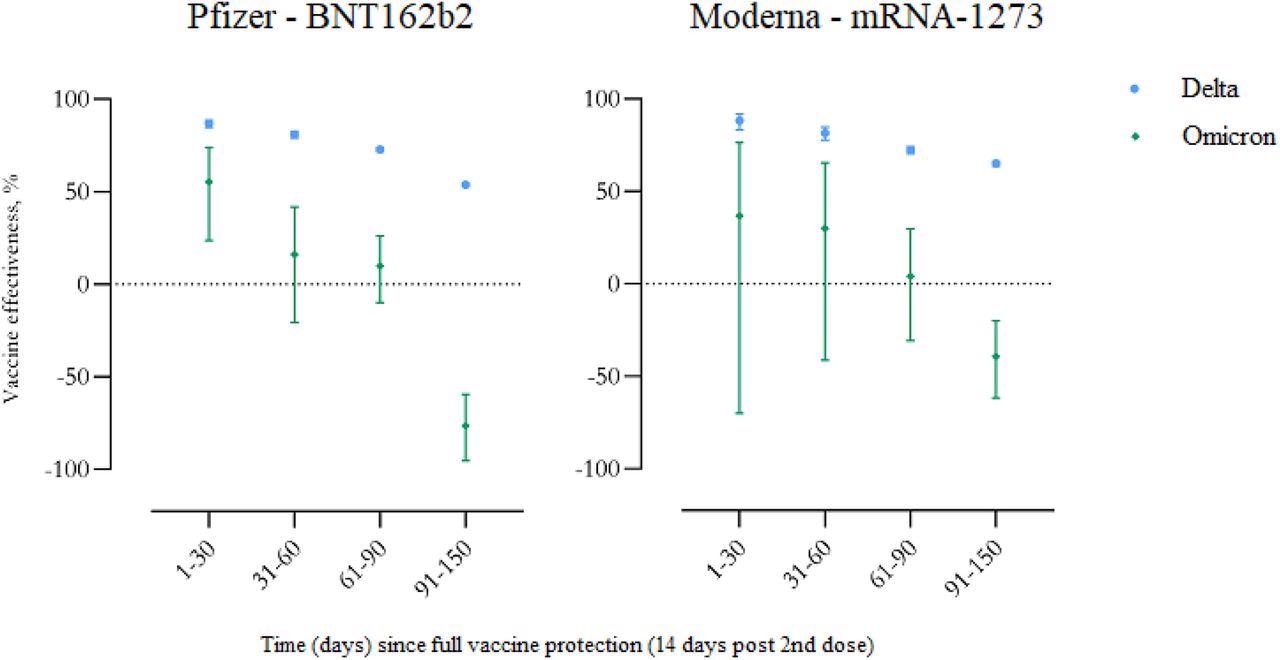In November 2021, the World Health Organization (WHO) classified the rapidly spreading severe acute respiratory syndrome coronavirus 2 (SARS‑CoV‑2) Omicron variant B.1.1.529 as a variant of concern (VOC). This variant has since spread to over 50 countries worldwide.

Study: Vaccine effectiveness against SARS-CoV-2 infection with the Omicron or Delta variants following a two-dose or booster BNT162b2 or mRNA-1273 vaccination series: A Danish cohort study. Image Credit: george martin studio / Shutterstock.com

 This news article was a review of a preliminary scientific report that had not undergone peer-review at the time of publication. Since its initial publication, the scientific report has now been peer reviewed and accepted for publication in a Scientific Journal. Links to the preliminary and peer-reviewed reports are available in the Sources section at the bottom of this article. View Sources
This news article was a review of a preliminary scientific report that had not undergone peer-review at the time of publication. Since its initial publication, the scientific report has now been peer reviewed and accepted for publication in a Scientific Journal. Links to the preliminary and peer-reviewed reports are available in the Sources section at the bottom of this article. View Sources
About the study
In the present study, researchers collected data regarding reverse transcriptase-polymerase chain reaction (RT-PCR)-confirmed SARS-CoV-2 cases in individuals who were fully vaccinated with two-dose or booster BNT162b2 or mRNA-1273 vaccines from Danish health registries between November 20, 2021, and December 12, 2021. In order to differentiate between Delta and Omicron variants, the researchers performed whole-genome sequencing on the RT-PCR-confirmed SARS-CoV-2 samples.
VE was evaluated by a time-to-event analysis by comparing the rate of infection between unvaccinated and vaccinated individuals with two-dose or booster BNT162b2 or mRNA-1273 vaccination series.
Study findings
By the end of the study period on December 12, 2021, 5,767 Omicron cases were identified in Denmark with a median age of 28 years. Initially, VE against the Omicron variant in recipients of the BNT162b2 and mRNA-1273 vaccines were 55.2% and 36.7%, respectively; however, VE declined rapidly thereafter for both vaccines.

Vaccine effectiveness against SARS-CoV-2 infection with the Delta and Omicron variants, shown separately for the BNT162b2 and mRNA-1273 vaccines. Vertical bars indicate 95% confidence intervals.
For those who had received booster dose 14 to 44 days before the study period, VE rose to an average of 54.6%. The VE from both vaccines showed significantly higher protection against SARS-CoV-2 infection with the Delta variant as compared to the Omicron variant.
The high transmissibility of the Omicron variant further resulted in negative estimates, which indicated differences in the behaviors and exposure patterns of SARS-CoV-2 infection between vaccinated and unvaccinated individuals.
Another study in England found 75.5% VE among BNT162b2 booster-vaccinated individuals. However, the increase in VE after the booster dose also declined rapidly over time, which supports the present study findings.
Conclusions
Overall, the current study showed that protection against the SARS-CoV-2 Omicron variant declines rapidly over time after primary vaccination with BNT162b2 or mRNA-1273 vaccines. However, booster doses can significantly increase protection. Importantly, the researchers observed that VE against SARS-CoV-2 Delta infection is higher in comparison to that against Omicron infection.
“In light of the exponential rise in Omicron cases, there is an essential need for massive rollout of vaccinations and booster vaccinations.”

 This news article was a review of a preliminary scientific report that had not undergone peer-review at the time of publication. Since its initial publication, the scientific report has now been peer reviewed and accepted for publication in a Scientific Journal. Links to the preliminary and peer-reviewed reports are available in the Sources section at the bottom of this article. View Sources
This news article was a review of a preliminary scientific report that had not undergone peer-review at the time of publication. Since its initial publication, the scientific report has now been peer reviewed and accepted for publication in a Scientific Journal. Links to the preliminary and peer-reviewed reports are available in the Sources section at the bottom of this article. View Sources
Journal references:
- Preliminary scientific report.
Hansen, C. H., Schelde, A. B., Mousten-Helm, I. R., et al. (2021). Vaccine effectiveness against SARS-CoV-2 infection with the Omicron or Delta variants following a two-dose or booster BNT162b2 or mRNA-1273 vaccination series: A Danish cohort study. medRxiv. doi:10.1101/2021.12.20.21267966. https://www.medrxiv.org/content/10.1101/2021.12.20.21267966v3.
- Peer reviewed and published scientific report.
Gram, Mie Agermose, Hanne-Dorthe Emborg, Astrid Blicher Schelde, Nikolaj Ulrik Friis, Katrine Finderup Nielsen, Ida Rask Moustsen-Helms, Rebecca Legarth, et al. 2022. “Vaccine Effectiveness against SARS-CoV-2 Infection or COVID-19 Hospitalization with the Alpha, Delta, or Omicron SARS-CoV-2 Variant: A Nationwide Danish Cohort Study.” Edited by James G. Beeson. PLOS Medicine 19 (9): e1003992. https://doi.org/10.1371/journal.pmed.1003992. https://journals.plos.org/plosmedicine/article?id=10.1371/journal.pmed.1003992.